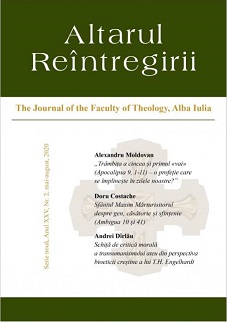Schiță de critică morală a transumanismului ateu din perspectiva bioeticii creștine a lui T.H. Engelhardt
Sketching a moral criticism of atheist transhumanism from the perspective of H. T. Engelhardt’s Christian bioethics
Author(s): Andrei DîrlăuSubject(s): Christian Theology and Religion, Theology and Religion
Published by: Facultatea de Teologie Ortodoxă Alba Iulia
Keywords: Posthumanism; ideological utopia; moral pluralism; rational and impartial observer; canonical morality; God’s-eye view; moral law; imperative character; angry nihilism; dysteleology;
Summary/Abstract: There are presented the definitions and pretensions of the utopic and atheistic ideology called “transhumanism”; the differences between “transhumanism” and “posthumanism”. There are discussed the moral criteria that should guide transhumanism and their lack of foundation. With arguments from Christian bioethics, philosophy, and theology from H. T. Engelhardt’s book After God, it is proven that secularistic morality has no canonical foundation, being grounded upon a perspective that is immanent, arbitrary, “out of nowhere”; lacking an ultimate referential and transcendent framework, so having no absolute validity. Such morality is contingent, and it has no objectivity, impartiality, unicity, canonicity, and a universal imperative character. Its consequences are serious: atheist morality is weakened, reduced to a simple political agenda, without being able to legitimate a rule according to higher law, only one that is secularistically fundamentalist. Atheist transhumanism is marked by serious ethical shortages even in its own philosophical grounding. There is the major risk that a society without God collapses, since man cannot survive in a dysteleologic world without an ultimate, transcendent finality. Technology without valid ethical criteria risks destroying humanity. Christian transhumanism is an alternative to the atheist one, but within the limits that pertain to the conflict that resides between their different methodological postulations. Even if Romania does not confront with transhumanistic ideology yet, in the future this ideology will not be late in manifesting itself, as new technology will change our lives and mass media will expose to newer generations transhumanistic ideas in a veiled and not so veiled manner.
Journal: Altarul Reîntregirii
- Issue Year: XXV/2020
- Issue No: 2
- Page Range: 73-106
- Page Count: 34
- Language: Romanian

